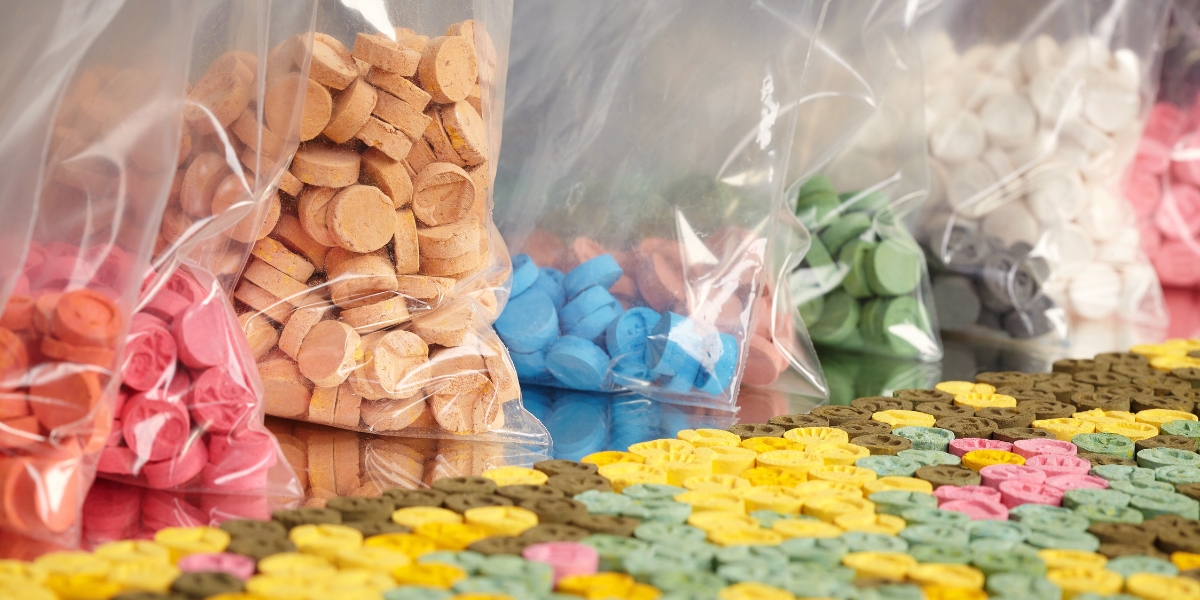MDMA (Ecstasy) Withdrawal: Symptoms, Timeline, and Detox

When MDMA, also known as ecstasy or molly, first appeared, people dismissed it as a party or club drug with no serious risks or long-term effects. As MDMA use became more widespread, researchers realized that ecstasy abuse causes dependence, lasting chemical changes, and intense and sometimes dangerous withdrawal symptoms.
The effects of MDMA withdrawal can produce overwhelming depression and anxiety that impacts users long after the drug physically leaves their system.
The safest way to withdraw from ecstasy and overcome addiction is to seek professional help that offers safe medical detox and follow-up treatment programs.
What Is MDMA (Ecstasy)?
MDMA, also called molly or ecstasy, is a synthetic psychoactive drug. MDMA is most famous as a party drug on the rave and club scene but has gained wider use in the general population. Users frequently combine ecstasy with other drugs and alcohol.
MDMA floods the brain with serotonin to produce euphoria, heightened sensitivity to physical stimuli, increased self-awareness, sociability, and in some cases, greater empathy toward other people. MDMA also releases other chemicals that cause physical effects, including a surge of energy, increased blood pressure and heart rate, and in some cases, overheating and organ failure.
MDMA is an abbreviation for the chemical compound 3,4-methylenedioxymethamphetamine; ecstasy refers to the pill or tablet form, and molly is slang for the pure powder form. Unfortunately, the word “pure” is misleading because dealers frequently add other drugs to their batches to make them cheaper and more potent, leading to unforeseen side effects and dangers.
The most common way people take MDMA is in tablet or capsule form, but some prefer snorting or smoking it to feel the effects faster.
Slang Names for MDMA
Even though MDMA, ecstasy, and molly refer to different forms of the drug, users often use them interchangeably. Other slang terms come from creative combinations that sound similar to MDMA or ecstasy or reference its effects.
Slang terms for MDMA include:
- Ecstasy
- Molly
- X
- E
- XTC
- STP
- Adam
- Hug Drug
- Lover’s speed
- Disco biscuit
- Biscuit
MDMA Abuse
According to the National Institute on Drug Abuse (NIDA), roughly 2.6 million people report using MDMA every year, and 17 million admit to MDMA abuse at least once throughout their lives.
People doubling up on doses or taking more when the effects from the first dose start to wear off is a common form of ecstasy abuse that increases the risks of life-threatening side effects.
Because it is so common to mix it with other drugs and alcohol, researchers have had difficulties understanding the scope of ecstasy addiction, as it usually occurs with other substance use disorders or co-occurring conditions.
As a primarily psychoactive drug, MDMA substance abuse has fewer physical symptoms and more psychological symptoms. Experts believe ecstasy addiction mainly stems from users continuously chasing the euphoric highs and mental stimulation it causes, which eventually leads to some physical dependence as tolerance builds.

What Is Suicide Tuesday?
Suicide Tuesday refers to an unofficial trend of weekday suicides that experts observed in MDMA users. Depression, anxiety, and agitation are some of the main ecstasy withdrawal symptoms, which peak two to four days after use. Because most people use it as a party drug on the weekends, those feelings were most intense early in the week afterward. People with mental health conditions may be more overwhelmed by the withdrawal symptoms and act impulsively by attempting suicide.
Timeline for Withdrawal of MDMA
The timeline for MDMA withdrawal can vary based on the person’s physical and mental health factors, how much ecstasy they usually take, how long they have been abusing it, and if they are experiencing symptoms of withdrawal from other drugs. MDMA heavily impacts brain chemistry, causing withdrawal to last as long as it takes to naturally regain balance, even after the drug is out of the system.
The average MDMA withdrawal timeline is as follows:
- First 12 to 24 hours after taking MDMA— people experience exhaustion and fatigue, loss of appetite, and trouble sleeping. They might start to feel depressed and anxious.
- 2 to 4 days after taking MDMA— people experience intense drug cravings and feelings of depression, anxiety, irritability, and paranoia. Some feel sore and physically ill with persistent loss of appetite and fatigue. Withdrawal combined with mental health conditions can lead to suicidal thoughts and urges that should be monitored and taken seriously.
- 4 to 10 days after taking MDMA— the symptoms become less intense, but people may still experience difficulty sleeping and concentrating and feel mentally tired. Lingering feelings of depression and anxiety may require professional treatment.
- Ten days or longer after taking MDMA— people might experience intermittent or random cravings, but the physical symptoms will have cleared up. Lingering psychological symptoms can take longer or require professional treatment.
MDMA Withdrawal Symptoms
MDMA withdrawal symptoms are primarily psychological but also include some physical symptoms. The intensity of ecstasy withdrawal symptoms will differ for each person and can become more complicated if they are simultaneously experiencing withdrawal from other substances.
MDMA withdrawal symptoms include:
- Fatigue
- Appetite loss
- Muscle aches and soreness
- Stiff jaw
- Headaches
- Memory problems
- Trouble concentrating
- Restlessness
- Irritability
- Anxiety
- Paranoia
- Depression
- Drug cravings
- Sudden mood swings
- Suicidal thoughts
MDMA withdrawal is somewhat unique in that the psychological effects are more dangerous than the physical withdrawal symptoms. People overwhelmed with depression and hopelessness can act out in life-threatening ways, including returning to substance abuse or self-harm.
People who want to quit using MDMA can benefit from inpatient rehab and treatment facilities that monitor and treat all withdrawal symptoms while ensuring their safety.

Medical Detox for MDMA Withdrawal
Medical detox for MDMA withdrawal provides a safe environment that helps ease the physical discomfort of withdrawal and treats mental health conditions with effective, non-addictive medications like anti-depressants. Medical detox can also treat symptoms of withdrawal related to other substances that may be happening simultaneously.
Inpatient treatment centers provide 24-hour medical care and attention during detox, which is vital to address any complications or extreme mental distress that can occur during withdrawal.
Medical detox alone will not adequately treat substance use disorders; an in-depth treatment program should follow to address the long-term effects of MDMA abuse.
Ecstasy Addiction Treatment
There is no standard treatment for overcoming ecstasy addiction; however, the National Institute on Drug Abuse (NIDA) shows that the highest success rates come from treatment programs that use cognitive-behavioral therapies.
Our experienced and licensed Northridge Addiction Treatment Center staff is prepared to help you overcome addiction and start on a path to lifelong recovery.
We provide onsite medical detox to keep you safe and supported through withdrawal while your body starts to recover with the help of freshly made gourmet meals and around-the-clock care.
While staying in our comfortable and private residential care facility, you’ll work closely with our compassionate team to overcome addiction using evidence-based treatments and learn the skills to live free from substance abuse.
Reach out to our treatment specialists now. A new life is just one call away.
Find Meaningful Recovery
Our caring and compassionate specialists are eager to help you comfortably navigate this journey to recovery. Our individualized treatment plan, programs, and therapies may be a perfect match for you or your loved one. Let us assist you in living the happy life you deserve. It starts with a phone call.




